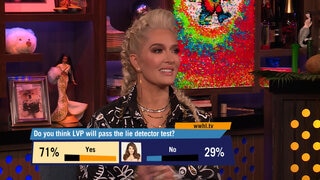Polygraph Expert Says If Lisa Vanderpump Is Lying About Puppygate, It Would Show up "Because She Has a Lot to Lose"
A lie detector test administrator of 37 years breaks down the test for Personal Space.

Lisa Vanderpump is subjecting herself to unusual means to prove she didn’t leak stories to the press about Dorit Kemsley and Puppygate.
The Real Housewives of Beverly Hills restaurateur was heartbroken after she was accused by her costars of being the leak, so at the end of the May 14 episode, Lisa decided she needed to undergo a lie detector test
Kyle took to Twitter to voice her opinion on the polygraph, writing: ”Are you kidding me? NOOOOO! Who goes to these lengths? Who wrote the questions? Who ordered the test?" She also retweeted a fan who said, "That looked super set up, and John Sessa there? So weird!" Kyle commented back, "I mean, I don't think the FBI was behind this."
Erika Girardi later hit Watch What Happens Live with Andy Cohen (see clip above) where she claimed a lie detector test was “not the way to do it… Who does that?”
Well, someone who wants to prove their innocence, apparently. Personal Space called polygraph expert John Ross of NY Polygraph, and talked him through LVP’s situation. Here is his take on her polygraph:
“I’ve been doing polygraphs for 37 years, and there are many, many factors that go into taking one,” Ross explained.
He said people who generally get away with small lies on the test are ones for who, psychologically, the lie means nothing. “There’s no loss there, you’re not facing prison time, you’re not facing the loss of a job or a marriage, or risking something big,” he said. “The greatest threat to the person is the big psychological part. Depending on what your reputation is, if you’re a big executive and what you’re being tested for has significance to it, and you have a lot to lose, then yeah, you have a [lot hanging] on it.”
When we explained Lisa’s restaurant empire and reputation as a respected businesswoman, he said it’s unlikely she would pass if she were lying, because if all the elements (explained below) are right, a lie “would show up because she has a lot to lose.”
Who conducts the test, where, and under what circumstances also holds a great deal of importance.
“Who did the test, what was the circumstances of the test as far as where was it done, what were the questions asked, there are all very important,” Ross continued. “If it’s done properly, under the proper conditions, and the correct questions are asked, it’s going to work.”
There’s also a medical part to a polygraph, Ross explained.
“Pain medications, being asthmatic, having a heart condition, having alcohol or marijuana in your system, they all potentially change the outcome,” he said. “Also, you can’t have any coffee tea, energy drinks, cigarettes before, or anything raises your blood pressure.”
That said, Los Angeles has some of the best polygraph examiners in the world, Ross added.
How it works?
The polygraph has nothing to do with being nervous. Instead it will read your upper and lower respiratory rate and your heart rate and if you’re sweating. The examiner asks balancing and control questions, then peppers those with what you’re potentially lying about.
Here’s to Lisa passing this thing and Puppygate being put behind us — for good.







